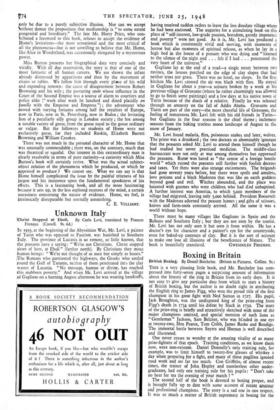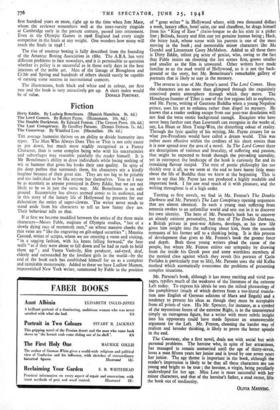Boxing in Britain
British Boxing. By Denzil Batchelor. (Britain in Pictures. Collins. 5s.) Tins is a very pleasing little book, and Mr. Batchelor has com- pressed into forty-seven pages a surprising amount of information about the history of the ring in Britain from its early days. It is not easy to give any particular date from which to start a history of British boxing, but the author is no doubt right in attributing the English ring to James Figg, who won the proud title of the first champion in his great fight with Ned Sutton in 1727. His pupil, Jack Broughton, was the undisputed king of the prize-ring from Figg's death in 1734 until his defeat by Slack in 1750. The story of the prize-ring is briefly and attractively sketched with none of, the major champions omitted, and special mention of such lions as "Gentleman" Jackson, Sam Belcher, who was blinded in one eye at twenty-two, Hen Pearce, Tom Cribb, James Burke and Bendigo. The immortal battle between Sayers and Heenan is well described and illustrated.
One never ceases to wonder at the amazing vitality of so many prize-fighters of that epoch. Training conditions, as we know them now, were non-existent. Daniel Donnelly's only training rule, for example, was to limit himself to twenty-five glasses of whiskey a day when preparing for a fight, and many of these pugilists ignored road work and ate far too much. Con Griffiths, of almost recent times, the trainer of John Hopley and numberless other under- graduates, had only one training rule for his pupils: "Don't take no beer for tea the evening of your match 1 "
The second half of the book is devoted to boxing proper, and is brought fully up to date with some account of recent amateur and professional champions. The story is a, sad one in one respect. It was so much a matter of British supremacy in boxing for the
first hundred years or more, right up to the time when Jem Mace, whom the reviewer remembers well at the inter-varsity ringside at Cambridge early in the present century, passed into retirement. Even in the Olympic Games in 1908 England had every single competitor in the finals at any weight. One wonders how many will reach the finals in 1948 ! .
The rise of amateur boxing is fully described from the founding of the Amateur Boxing Association in 1880. The A.B.A. has very different problems to face nowadays, and it is permissible to question whether its policy is as successful as in those early days in the best interests of the noble art. Men of the lineage of Broughton and Cribb and Spring and hundreds of others should surely be capable of earning some success in international contests.
The illustrations, both black and white and in colour, are first rate and the book is very attractively got up. A short index would































 Previous page
Previous page